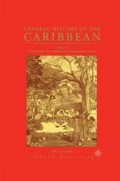Abstract
The very first settlers who arrived in the island Caribbean from either Central or South America, around 5000 BC or slightly later, were of Amerindian stock. They were technologically primitive, though capable of travel across oceanic waters by means of timber rafts, with mat sails. Although together they have been accorded the group name of ‘palaeo-Indians’, it is as yet uncertain whether there were any major cultural differences between them in their main foci of settlement within Trinidad, Cuba and Espanola. It is likely that their numbers were always small. Preferred sites for settlement were usually close to sea level, on favoured coasts. Those in Trinidad were easily reached by migrants from adjacent South America, across the narrow Gulf of Paria; while the longer journey from the Mexican and Central American eastern coastlines, and especially from the vicinity of Cap Gracias a Dios, to settlements in Cuba and Espanola, was made easier by favourable seasonal conditions of winds and currents. Such peoples possessed a stone-, or more commonly a shell-tool technology, and were well adapted to seashore living. Also derived from their mainland areas of origin, were skills they had developed for the capture of large land mammals, or sea mammals such as the manatee, for food. Although some medium-sized land mammals were present in Trinidad at the time of this early settlement, none, other than the iguana, were to be found elsewhere in the island Caribbean. There the main food resources for established palaeo-Indian groups quickly came to be the manatee, along with possibly the green turtle, a variety of shellfish, sea fish and a range of plant foods.
Access this chapter
Tax calculation will be finalised at checkout
Purchases are for personal use only
Preview
Unable to display preview. Download preview PDF.
Notes
J.M. Cruxent and I. Rouse, ‘Early man in the West Indies’, Scientific American, Vol. 221 (1969), pp. 42–52
Avid A. Hodell, Jason M. Curtis, Glenn A. Jones, Antonia Higuera-Grundy, Mark Brenner, Michael W. Binford and Kathleen T. Dorsey, ‘Reconstruction of Caribbean climatic changes over the past 10,500 years’, Nature, Vol. 352 (London, 1991), pp. 790–3.
W.C. Sturtevant, ‘Taino agriculture’, Antropologica, Supplement, Vol. 3 (1961), pp. 69–82.
John S. Beard, ‘The classification of tropical American vegetation types’, Ecology, Vol. 36 (1955), pp. 89–100.
P. Bowman-Boyd, ‘Patterns of Spanish emigration to the Indies until 1600’, Hispanic American Historical Review, Vol. 56 (1976), pp. 580–605.
Robert M. May, ‘The world’s worst weeds’, Nature, London, Vol. 290 (1981), pp. 85–6.
Editor information
Copyright information
© 2003 Palgrave Macmillan, a division of Nature America Inc.
About this chapter
Cite this chapter
Watts, D. (2003). The Caribbean environment and early settlement. In: Emmer, P.C., Damas, G.C. (eds) General History of the Caribbean. Palgrave Macmillan, New York. https://doi.org/10.1007/978-1-349-73767-3_2
Download citation
DOI: https://doi.org/10.1007/978-1-349-73767-3_2
Publisher Name: Palgrave Macmillan, New York
Print ISBN: 978-1-349-73769-7
Online ISBN: 978-1-349-73767-3
eBook Packages: Palgrave History CollectionHistory (R0)

